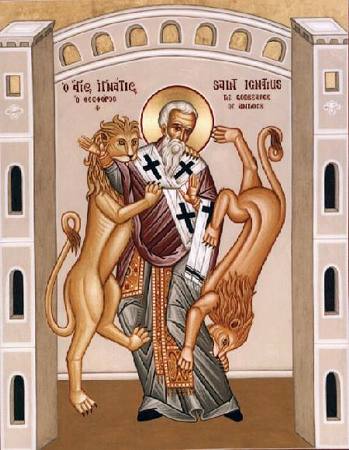Pseudo-Ignatius on:
[Wikipedia]
[Google]
[Amazon]
 Pseudo-Ignatius was a 4th-century writer who claimed to be
Pseudo-Ignatius was a 4th-century writer who claimed to be
 Pseudo-Ignatius was a 4th-century writer who claimed to be
Pseudo-Ignatius was a 4th-century writer who claimed to be Ignatius of Antioch
Ignatius of Antioch (; ; died 108/140), also known as Ignatius Theophorus (), was an early Christian writer and Patriarch of Antioch. While en route to Rome, where he met his Christian martyrs, martyrdom, Ignatius wrote a series of letters. This ...
. He is the author of the Ignatian forgeries but he also wrote the Apostolic Constitutions
The ''Apostolic Constitutions'' or ''Constitutions of the Holy Apostles'' (Latin: ''Constitutiones Apostolorum'') is a Christian collection divided into eight books which is classified among the Church Orders, a genre of early Christian litera ...
and a Commentary on Job. Harnack also identified Pseudo-Clement
The Clementine literature (also referred to as the Clementine Romance or Pseudo-Clementine Writings) is a late antique third-century Christian romance containing an account of the conversion of Clement of Rome to Christianity, his subsequent lif ...
with Pseudo-Ignatius. Pseudo-Ignatius has some Arian leanings but is not completely Arian; on the other hand, he in some ways resembles the Apollinarians
Apollinarism or Apollinarianism is a Christological position proposed by Apollinaris of Laodicea that argues that Jesus had a human body and sensitive human soul, but a divine mind and not a human rational mind, the Divine Logos taking the place ...
. However it is not possible to draw clear conclusions on his Christology
In Christianity, Christology is a branch of Christian theology, theology that concerns Jesus. Different denominations have different opinions on questions such as whether Jesus was human, divine, or both, and as a messiah what his role would b ...
.
According to Bart D. Ehrman
Bart Denton Ehrman (born October 5, 1955) is an American New Testament scholar focusing on textual criticism of the New Testament, the historical Jesus, and the origins and development of early Christianity. He has written and edited 30 books ...
, the writer likely claimed the name Ignatius to bolster his own theological views.
Theology
Pseudo-Ignatius opposedasceticism
Asceticism is a lifestyle characterized by abstinence from worldly pleasures through self-discipline, self-imposed poverty, and simple living, often for the purpose of pursuing Spirituality, spiritual goals. Ascetics may withdraw from the world ...
and he had Arian
Arianism (, ) is a Christological doctrine which rejects the traditional notion of the Trinity and considers Jesus to be a creation of God, and therefore distinct from God. It is named after its major proponent, Arius (). It is considered he ...
leanings. In the Apostolic Constitutions, he held 1-3 Maccabees, 1-2 Clement and possibly Judith as canonical (however some manuscripts lack Judith), but denied the canonical status of the Book of Revelation
The Book of Revelation, also known as the Book of the Apocalypse or the Apocalypse of John, is the final book of the New Testament, and therefore the final book of the Bible#Christian Bible, Christian Bible. Written in Greek language, Greek, ...
.
Pseudo-Ignatius in the Apostolic Constitutions affirmed paedocommunion
Infant communion, also known as paedocommunion, refers to the practice of giving the Eucharist, often in the form of consecrated wine mingled with consecrated bread, to young children. This practice is standard throughout Eastern Christianity, whe ...
, and baptism by immersion
Immersion baptism (also known as baptism by immersion or baptism by submersion) is a method of baptism that is distinguished from baptism by affusion (pouring) and by aspersion (sprinkling), sometimes without specifying whether the immersion is ...
.
Writings
Six epistles are generally attributed to Pseudo-Ignatius: * Epistle to the Tarsians * Epistle to the Antiochians * Epistle toHero
A hero (feminine: heroine) is a real person or fictional character who, in the face of danger, combats adversity through feats of ingenuity, courage, or Physical strength, strength. The original hero type of classical epics did such thin ...
, a Deacon of Antioch
* Epistle to the Philippians
* Epistle of Mary of Cassobola to Ignatius
* Epistle of Ignatius to Mary of Cassobloa
Four other epistles were added to the corpus in the late medieval era. They were originally written in Latin, and are not believed to be by the same author:
* First Epistle to St. John
* Second Epistle to St. John
* Epistle of Ignatius to the Virgin Mary
* Epistle of the Virgin Mary to Ignatius
In modern times, two other works have been attributed to the fourth-century author, though they were not circulated under Ignatius' name:
* The Apostolic Constitutions
The ''Apostolic Constitutions'' or ''Constitutions of the Holy Apostles'' (Latin: ''Constitutiones Apostolorum'') is a Christian collection divided into eight books which is classified among the Church Orders, a genre of early Christian litera ...
* A commentary on the Book of Job
The Book of Job (), or simply Job, is a book found in the Ketuvim ("Writings") section of the Hebrew Bible and the first of the Poetic Books in the Old Testament of the Christian Bible. The language of the Book of Job, combining post-Babylonia ...
Pseudo-Ignatius is also believed to have interpolated
In the mathematical field of numerical analysis, interpolation is a type of estimation, a method of constructing (finding) new data points based on the range of a discrete set of known data points.
In engineering and science, one often has a n ...
the genuine letters of Ignatius.
References
{{Reflist 4th-century Arian Christians 4th-century Christian theologians 4th-century Romans